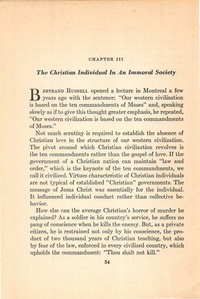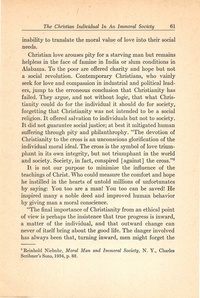This Earth One Country/The Christian individual in an immoral society
The text below this notice was generated by a computer, it still needs to be checked for errors and corrected. If you would like to help, view the original document by clicking the PDF scans along the right side of the page. Click the edit button at the top of this page (notepad and pencil icon) or press Alt+Shift+E to begin making changes. When you are done press "Save changes" at the bottom of the page. |
CHAPTER III
The Christian Individual In An Immoral Society
ERTRAND RUSSELL opened a lecture in Montreal a few B years ago with the sentence: “Our western civilization is based on the ten commandments of Moses” and, speaking slowly as if to give this thought greater emphasis, he repeated, “Our western civilization is based on the ten commandments of Moses.”
Not much scrutiny is required to establish the absence of Christian love in the structure of our western civilization. The pivot around which Christian civilization revolves is the ten commandments rather than the gospel of love. If the government of a Christian nation can maintain “law and order,” which is the keynote of the ten commandments, we call it civilized. Virtues characteristic of Christian individuals are not typical of established “Christian” governments. The message of Jesus Christ was essentially for the individual. It influenced individual conduct rather than collective behavior.
How else can the average Christian’s horror of murder be explained? As a soldier in his country’s service, he suffers no pang of conscience when he kills the enemy. But, as a private citizen, he is restrained not only by his conscience, the product of two thousand years of Christian teaching, but also by fear of the law, enforced in every civilized country, which upholds the commandment: “Thou shalt not kill.”
54
[Page 55]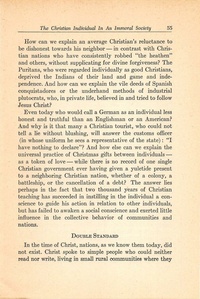 The Christian Individual In An Immoral Society 55
The Christian Individual In An Immoral Society 55
How can we explain an average Christian’s reluctance to be dishonest towards his neighbor — in contrast with Christian nations who have consistently robbed “the heathen” and others, without supplicating for divine forgiveness? The Puritans, who were regarded individually as good Christians, deprived the Indians of their land and game and independence. And how can we explain the vile deeds of Spanish conquistadores or the underhand methods of industrial plutocrats, who, in private life, believed in and tried to follow Jesus Christ?
Even today who would call a German as an individual less honest and truthful than an Englishman or an American? And why is it that many a Christian tourist, who could not tell a lie without blushing, will answer the customs officer (in whose uniform he sees a representative of the state): “I have nothing to declare”? And how else can we explain the universal practice of Christmas gifts between individuals — as a token of love — while there is no record of one single Christian government ever having given a yuletide present to a neighboring Christian nation, whether of a colony, a battleship, or the cancellation of a debt? The answer lies perhaps in the fact that two thousand years of Christian teaching has succeeded in instilling in the individual a conscience to guide his action in relation to other individuals, but has failed to awaken a social conscience and exerted little influence in the collective behavior of communities and nations.
DovusuE STANDARD
In the time of Christ, nations, as we know them today, did
not exist. Christ spoke to simple people who could neither
read nor write, living in small rural communities where they
[Page 56]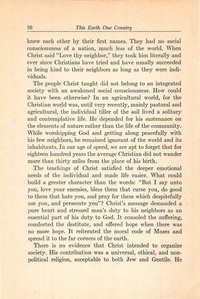 56 ; This Earth One Country
56 ; This Earth One Country
knew each other by their first names. They had no social consciousness of a nation, much less of the world. When Christ said “Love thy neighbor,” they took him literally and ever since Christians have tried and have usually succeeded in being kind to their neighbors as long as they were individuals.
The people Christ taught did not belong to an integrated society with an awakened social consciousness. How could it have been otherwise? In an agricultural world, for the Christian world was, until very recently, mainly pastoral and agricultural, the individual tiller of the soil lived a solitary and contemplative life. He depended for his sustenance on the elements of nature rather than the life of the community. While worshipping God and getting along peacefully with his few neighbors, he remained ignorant of the world and its inhabitants. In our age of speed, we are apt to forget that for eighteen hundred years the average Christian did not wander more than thirty miles from the place of his birth.
The teachings of Christ satisfied the deeper emotional needs of the individual and made life easier. What could build a greater character than the words: “But I say unto you, love your enemies, bless them that curse you, do good to them that hate you, and pray for them which despitefully use you, and persecute you”? Christ’s message demanded a pure heart and stressed man’s duty to his neighbors as an essential part of his duty to God. It consoled the suffering, comforted the destitute, and offered hope when there was no more hope. It reiterated the moral code of Moses and spread it to the far corners of the earth.
There is no evidence that Christ intended to organize
society. His contribution was a universal, ethical, and nonpolitical religion, acceptable to both Jew and Gentile. He
[Page 57]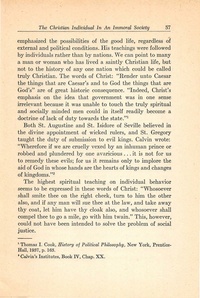 The Christian Individual In An Immoral Society 57
The Christian Individual In An Immoral Society 57
emphasized the possibilities of the good life, regardless of external and political conditions. His teachings were followed by individuals rather than by nations. We can point to many a man or woman who has lived a saintly Christian life, but not to the history of any one nation which could be called truly Christian. The words of Christ: “Render unto Caesar the things that are Caesar’s and to God the things that are God’s” are of great historic consequence. “Indeed, Christ’s emphasis on the idea that government was in one sense irrelevant because it was unable to touch the truly spiritual and socially minded men could in itself readily become a doctrine of lack of duty towards the state.”?
Both St. Augustine and St. Isidore of Seville believed in the divine appointment of wicked rulers, and St. Gregory taught the duty of submission to evil kings. Calvin wrote: “Wherefore if we are cruelly vexed by an inhuman prince or robbed and plundered by one avaricious ...it is not for us to remedy these evils; for us it remains only to implore the aid of God in whose hands are the hearts of kings and changes of kingdoms.”
The highest spiritual teaching on individual behavior seems to be expressed in these words of Christ: “Whosoever shall smite thee on the right cheek, turn to him the other also, and if any man will sue thee at the law, and take away thy coat, let him have thy cloak also, and whosoever shall compel thee to go a mile, go with him twain.” This, however, could not have been intended to solve the problem of social justice.
- Thomas I. Cook, History of Political Philosophy, New York, PrenticeHall, 1987, p. 163.
- Calvin’s Institutes, Book IV, Chap. XX.
[Page 58]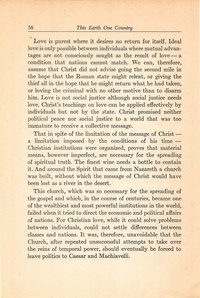 58 This Earth One Country
58 This Earth One Country
- Love is purest where it desires no return for itself. Ideal
love is only possible between individuals where mutual advantages are not consciously sought as the result of love—a condition that nations cannot match. We can, therefore, assume that Christ did not advise going the second mile in the hope that the Roman state might relent, or giving the thief all in the hope that he might return what he had taken, or loving the criminal with no other motive than to disarm him. Love is not social justice although social justice needs love. Christ’s teachings on love can be applied effectively by individuals but not by the state. Christ promised neither political peace nor social justice to a world that was too immature to receive a collective message.
That in spite of the limitation of the message of Christ — a limitation imposed by the conditions of his time — Christian institutions were organized, proves that material means, however imperfect, are necessary for the spreading of spiritual truth. The finest wine needs a bottle to contain it. And around the Spirit that came from Nazareth a church was built, without which the message of Christ would have been lost as a river in the desert.
This church, which was so necessary for the spreading of
the gospel and which, in the course of centuries, became one
of the wealthiest and most powerful institutions in the world,
failed when it tried to direct the economic and political affairs
of nations. For Christian love, while it could solve problems
between individuals, could not settle differences between
classes and nations. It was, therefore, unavoidable that the
Church, after repeated unsuccessful attempts to take over
the reins of temporal power, should eventually be forced to
leave politics to Caesar and Machiavelli.
[Page 59]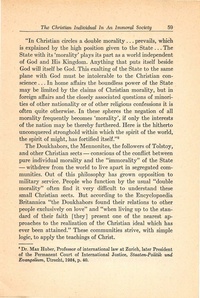 The Christian Individual In An Immoral Society 59
The Christian Individual In An Immoral Society 59
“In Christian circles a double morality . . . prevails, which is explained by the high position given to the State... The State with its ‘morality’ plays its part as a world independent of God and His Kingdom. Anything that puts itself beside God will itself be God. This exalting of the State to the same plane with God must be intolerable to the Christian conscience ...In home affairs the boundless power of the State may be limited by the claims of Christian morality, but in foreign affairs and the closely associated questions of minorities of other nationality or of other religious confessions it is often quite otherwise. In these spheres the negation of all morality frequently becomes ‘morality’, if only the interests of the nation may be thereby furthered. Here is the hitherto unconquered stronghold within which the spirit of the world, the spirit of might, has fortified itself.’”*
The Doukhabors, the Mennonites, the followers of Tolstoy, and other Christian sects — conscious of the conflict between pure individual morality and the “immorality” of the State — withdrew from the world to live apart in segregated communities. Out of this philosophy has grown opposition to military service. People who function by the usual “double morality” often find it very difficult to understand these small Christian sects. But according to the Encyclopaedia Britannica “the Doukhabors found their relations to other people exclusively on love” and “when living up to the standard of their faith [they] present one of the nearest approaches to the realization of the Christian ideal which has ever been attained.” These communities strive, with simple logic, to apply the teachings of Christ.
- Dr. Max Huber, Professor of international law at Zurich, later President
of the Permanent Court of International Justice, Staaten-Politik und
Evangeliwm, Utrecht, 1924, p. 40.
[Page 60]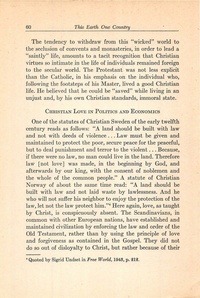 60 This Earth One Country
60 This Earth One Country
The tendency to withdraw from this “wicked” world to the seclusion of convents and monasteries, in order to lead a “saintly” life, amounts to a tacit recognition that Christian virtues so intimate in the life of individuals remained foreign to the secular world. The Protestant was not less explicit than the Catholic, in his emphasis on the individual who, following the footsteps of his Master, lived a good Christian life. He believed that he could be “saved” while living in an unjust and, by his own Christian standards, immoral state.
CHRISTIAN LovE In Pouirics AND Economics
One of the statutes of Christian Sweden of the early twelfth century reads as follows: “A land should be built with law and not with deeds of violence... Law must be given and maintained to protect the poor, secure peace for the peaceful, but to deal punishment and terror to the violent . . . Because, if there were no law, no man could live in the land. Therefore law [not love] was made, in the beginning by God, and afterwards by our king, with the consent of noblemen and the whole of the common people.” A statute of Christian Norway of about the same time read: “A land should be built with law and not laid waste by lawlessness. And he who will not suffer his neighbor to enjoy the protection of the law, let not the law protect him.’* Here again, love, as taught by Christ, is conspicuously absent. The Scandinavians, in common with other European nations, have established and maintained civilization by enforcing the law and order of the Old Testament, rather than by using the principle of love and forgiveness as contained in the Gospel. They did not do so out of disloyalty to Christ, but rather because of their
- Quoted by Sigrid Undset in Free World, 1943, p. 212.
The Christian Individual In An Immoral Society 61
inability to translate the moral value of love into their social needs.
Christian love arouses pity for a starving man but remains helpless in the face of famine in India or slum conditions in Alabama. To the poor are offered charity and hope but not a social revolution. Contemporary Christians, who vainly seek for love and compassion in industrial and political leaders, jump to the erroneous conclusion that Christianity has failed. They argue, and not without logic, that what Christianity could do for the individual it should do for society, forgetting that Christianity was not intended to be a social religion. It offered salvation to individuals but not to society. It did not guarantee social justice; at best it mitigated human suffering through pity and philanthrophy. “The devotion of Christianity to the cross is an unconscious glorification of the individual moral ideal. The cross is the symbol of love triumphant in its own integrity, but not triumphant in the world and society. Society, in fact, conspired [against] the cross.’®
It is not our purpose to minimize the influence of the teachings of Christ. Who could measure the comfort and hope he instilled in the hearts of untold millions of unfortunates by saying: You too are a man! You too can be saved! He inspired many a noble deed and improved human behavior by giving man a moral conscience.
“The final importance of Christianity from an ethical point of view is perhaps the insistence that true progress is inward, a matter of the individual, and that outward change can never of itself bring about the good life. The danger involved has always been that, turning inward, men might forget the
- Reinhold Niebuhr, Moral Man and Immoral Society, N. Y., Charles
Scribner’s Sons, 1934, p. 82.
[Page 62]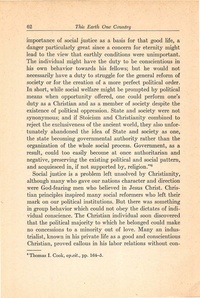 62 This Earth One Country
62 This Earth One Country
importance of social justice as a basis for that good life, a danger particularly great since a concern for eternity might lead to the view that earthly conditions were unimportant. The individual might have the duty to be conscientious in his own behavior towards his fellows; but he would not necessarily have a duty to struggle for the general reform of society or for the creation of a more perfect political order. In short, while social welfare might be prompted by political means when opportunity offered, one could perform one’s duty as a Christian and as a member of society despite the existence of political oppression. State and society were not synonymous; and if Stoicism and Christianity combined to reject the exclusiveness of the ancient world, they also unfortunately abandoned the idea of State and society as one, the state becoming governmental authority rather than the organization of the whole social process. Government, as a result, could too easily become at once authoritarian and negative, preserving the existing political and social pattern, and acquiesced in, if not supported by, religion.”®
Social justice is a problem left unsolved by Christianity, although many who gave our nations character and direction were God-fearing men who believed in Jesus Christ. Christian principles inspired many social reformers who left their mark on our political institutions. But there was something in group behavior which could not obey the dictates of individual conscience. The Christian individual soon discovered that the political majority to which he belonged could make no concessions to a minority out of love. Many an industrialist, known in his private life as a good and conscientious Christian, proved callous in his labor relations without con
° Thomas I. Cook, op.cit., pp. 164-5.
[Page 63]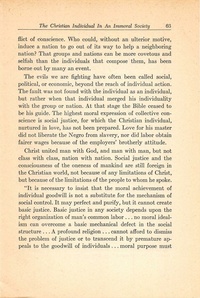 The Christian Individual In An Immoral Society 63
The Christian Individual In An Immoral Society 63
flict of conscience. Who could, without an ulterior motive, induce a nation to go out of its way to help a neighboring nation? That groups and nations can be more covetous and selfish than the individuals that compose them, has been borne out by many an event.
The evils we are fighting have often been called social, political, or economic, beyond the reach of individual action. Thefault was not found with the individual as an individual, but rather when that individual merged his individuality with the group or nation. At that stage the Bible ceased to be his guide. The highest moral expression of collective conscience is social justice, for which the Christian individual, nurtured in love, has not been prepared. Love for his master did not liberate the Negro from slavery, nor did labor obtain fairer wages because of the employers’ brotherly attitude.
Christ united man with God, and man with man, but not class with class, nation with nation. Social justice and the consciousness of the oneness of mankind are still foreign in the Christian world, not because of any limitations of Christ, but because of the limitations of the people to whom he spoke.
“Tt is necessary to insist that the moral achievement of
individual goodwill is not a substitute for the mechanism of
social control. It may perfect and purify, but it cannot create
basic justice. Basic justice in any society depends upon the
right organization of man’s common labor . . . no moral idealism can overcome a basic mechanical defect in the social
structure... A profound religion ...cannot afford to dismiss
the problem of justice or to transcend it by premature appeals to the goodwill of individuals ...moral purpose must
[Page 64]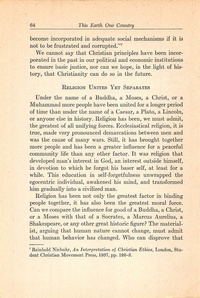 ee ee ee, — eT
ee ee ee, — eT
64 This Earth One Country
become incorporated in adequate social mechanisms if it is not to be frustrated and corrupted.”*
We cannot say that Christian principles have been incorporated in the past in our political and economic institutions to ensure basic justice, nor can we hope, in the light of history, that Christianity can do so in the future.
Reuicion Unites Yet SEPARATES
Under the name of a Buddha, a Moses, a Christ, or a Muhammad more people have been united for a longer period of time than under the name of a Caesar, a Plato, a Lincoln, or anyone else in history. Religion has been, we must admit, the greatest of all unifying forces. Ecclesiastical religion, it is true, made very pronounced demarcations between men and was the cause of many wars. Still, it has brought together more people and has been a greater influence for a peaceful community life than any other factor. It was religion that developed man’s interest in God, an interest outside himself, in devotion to which he forgot his baser self, at least for a while. This education in self-forgetfulness unwrapped the egocentric individual, awakened his mind, and transformed him gradually into a civilized man.
Religion has been not only the greatest factor in binding people together, it has also been the greatest moral force. Can we compare the influence for good of a Buddha, a Christ, or a Moses with that of a Socrates, a Marcus Aurelius, a Shakespeare, or any other great historic figure? The materialist, arguing that human nature cannot change, must admit that human behavior has changed. Who can disprove that
- Reinhold Niebuhr, An Interpretation of Christian Ethics, London, Student Christian Movement Press, 1937, pp. 192-3.
[Page 65]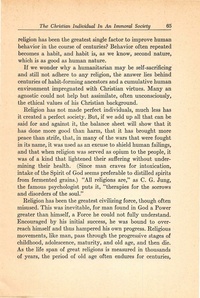 The Christian Individual In An Immoral Society 65
The Christian Individual In An Immoral Society 65
religion has been the greatest single factor to improve human behavior in the course of centuries? Behavior often repeated becomes a habit, and habit is, as we know, second nature, which is as good as human nature.
If we wonder why a humanitarian may be self-sacrificing and still not adhere to any religion, the answer lies behind centuries of habit-forming ancestors and a cumulative human environment impregnated with Christian virtues. Many an agnostic could not help but assimilate, often unconsciously, the ethical values of his Christian background.
Religion has not made perfect individuals, much less has it created a perfect society. But, if we add up all that can be said for and against it, the balance sheet will show that it has done more good than harm, that it has brought more peace than strife, that, in many of the wars that were fought in its name, it was used as an excuse to shield human failings, and that when religion was served as opium to the people, it was of a kind that lightened their suffering without undermining their health. (Since man craves for intoxication, intake of the Spirit of God seems preferable to distilled spirits from fermented grains.) “All religions are,” as C. G. Jung, the famous psychologist puts it, “therapies for the sorrows and disorders of the soul.”
Religion has been the greatest civilizing force, though often
misused. This was inevitable, for man found in God a Power
greater than himself, a Force he could not fully understand.
Encouraged by his initial success, he was bound to overreach himself and thus hampered his own progress. Religious
movements, like man, pass through the progressive stages of
childhood, adolescence, maturity, and old age, and then die.
As the life span of great religions is measured in thousands
of years, the period of old age often endures for centuries,
[Page 66]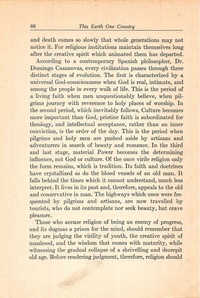 66 This Earth One Country
66 This Earth One Country
and death comes so slowly that whole generations may not notice it. For religious institutions maintain themselves long after the creative spirit which animated them has departed.
According to a contemporary Spanish philosopher, Dr. Domingo Casanovas, every civilization passes through three distinct stages of evolution. The first is characterized by a universal God-consciousness when God is real, intimate, and among the people in every walk of life. This is the period of a living faith when men unquestionably believe, when pilgrims journey with reverence to holy places of worship. In the second period, which inevitably follows, Culture becomes more important than God, pristine faith is subordinated for theology, and intellectual acceptance, rather than an inner conviction, is the order of the day. This is the period when pilgrims and holy men are pushed aside by artisans and adventurers in search of beauty and romance. In the third and last stage, material Power becomes the determining influence, not God or culture. Of the once virile religion only the form remains, which is tradition. Its faith and doctrines have crystallized as do the blood vessels of an old man. It falls behind the times which it cannot understand, much less interpret. It lives in its past and, therefore, appeals to the old and conservative in man. The highways which once were frequented by pilgrims and artisans, are now travelled by tourists, who do not contemplate nor seek beauty, but crave pleasure.
Those who accuse religion of being an enemy of progress,
and its dogmas a prison for the mind, should remember that
they are judging the virility of youth, the creative spirit of
manhood, and the wisdom that comes with maturity, while
witnessing the gradual collapse of a shrivelling and decrepit
old age. Before rendering judgment, therefore, religion should
[Page 67]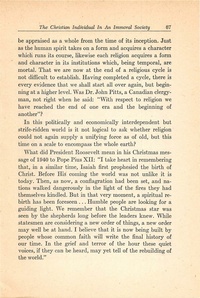 The Christian Individual In An Immoral Society 67
The Christian Individual In An Immoral Society 67
be appraised as a whole from the time of its inception. Just _ as the human spirit takes on a form and acquires a character which runs its course, likewise each religion acquires a form and character in its institutions which, being temporal, are mortal. That we are now at the end of a religious cycle is not difficult to establish. Having completed a cycle, there is every evidence that we shall start all over again, but beginning at a higher level. Was Dr. John Pitts, a Canadian clergyman, not right when he said: “With respect to religion we have reached the end of one era and the beginning of another’?
In this politically and economically interdependent but strife-ridden world is it not logical to ask whether religion’ could not again supply a unifying force as of old, but this time on a scale to encompass the whole earth?
What did President Roosevelt mean in his Christmas message of 1940 to Pope Pius XII: “I take heart in remembering
that, in a similar time, Isaiah first prophesied the birth of
Christ. Before His coming the world was not unlike it is
today. Then, as now, a conflagration had been set, and nations walked dangerously in the light of the fires they had
themselves kindled. But in that very moment, a spiritual rebirth has been foreseen ... Humble people are looking for a
guiding light. We remember that the Christmas star was
seen by the shepherds long before the leaders knew. While
statesmen are considering a new order of things, a new order
may well be at hand. I believe that it is now being built by
people whose common faith will write the final history of
our time. In the grief and terror of the hour these quiet
voices, if they can be heard, may yet tell of the rebuilding of
the world.”
[Page 68]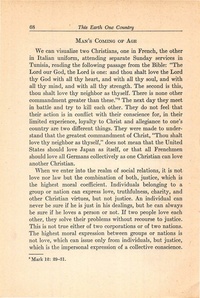 68 This Earth One Country
68 This Earth One Country
Man’s Comine or AGE
We can visualize two Christians, one in French, the other in Italian uniform, attending separate Sunday services in Tunisia, reading the following passage from the Bible: “The Lord our God, the Lord is one: and thou shalt love the Lord thy God with all thy heart, and with all thy soul, and with all thy mind, and with all thy strength. The second is this, thou shalt love thy neighbor as thyself. There is none other commandment greater than these.”’® The next day they meet in battle and try to kill each other. They do not feel that their action is in conflict with their conscience for, in their limited experience, loyalty to Christ and allegiance to one’s country are two different things. They were made to understand that the greatest commandment of Christ, “Thou shalt love thy neighbor as thyself,” does not mean that the United States should love Japan as itself, or that all Frenchmen should love all Germans collectively as one Christian can love another Christian.
When we enter into the realm of social relations, it is not love nor law but the combination of both, justice, which is the highest moral coefficient. Individuals belonging to a group or nation can express love, truthfulness, charity, and other Christian virtues, but not justice. An individual can never be sure if he is just in his dealings, but he can always be sure if he loves a person or not. If two people love each other, they solve their problems without recourse to justice. This is not true either of two corporations or of two nations. The highest moral expression between groups or nations is not love, which can issue only from individuals, but justice, which is the impersonal expression of a collective conscience.
® Mark 12: 29-31.
[Page 69]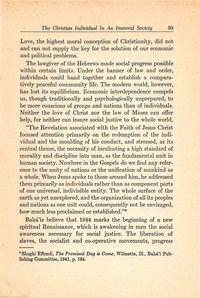 The Christian Individual In An Immoral Society 69
The Christian Individual In An Immoral Society 69
Love, the highest moral conception of Christianity, did not and can not supply the key for the solution of our economic and political problems.
The lawgiver of the Hebrews made social progress possible within certain limits. Under the banner of law and order, individuals could band together and establish a comparatively peaceful community life. The modern world, however, has lost its equilibrium. Economic interdependence compels us, though traditionally and psychologically unprepared, to be more conscious of groups and nations than of individuals. Neither the love of Christ nor the law of Moses can offer help, for neither can insure social justice to the whole world.
“The Revelation associated with the Faith of Jesus Christ focused attention primarily on the redemption of the individual and the moulding of his conduct, and stressed, as its central theme, the necessity of inculcating a high standard of morality and discipline into man, as the fundamental unit in human society. Nowhere in the Gospels do we find any reference to the unity of nations or the unification of mankind as a whole. When Jesus spoke to those around him, he addressed them primarily as individuals rather than as component parts of one universal, indivisible entity. The whole surface of the earth as yet unexplored, and the organization of all its peoples and nations as one unit could, consequently not be envisaged, how much less proclaimed or established.’””®
Baha'is believe that 1844 marks the beginning of a new spiritual Renaissance, which is awakening in men the social awareness necessary for social justice. The liberation of slaves, the socialist and co-operative movements, progress
°Shoghi Effendi, The Promised Day is Come, Wilmette, Ill., Baha’i Publishing Committee, 1941, p. 124,
[Page 70]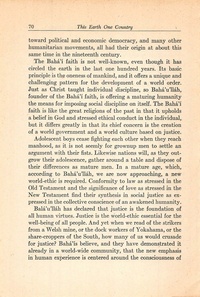 70 This Earth One Country \
70 This Earth One Country \
toward political and economic democracy, and many other humanitarian movements, all had their origin at about this same time in the nineteenth century.
The Baha’i faith is not well-known, even though it has circled the earth in the last one hundred years. Its basic principle is the oneness of mankind, and it offers a unique and challenging pattern for the development of a world order. Just as Christ taught individual discipline, so Baha’u’llah, founder of the Baha’i faith, is offering a maturing humanity the means for imposing social discipline on itself. The Baha’i faith is like the great religions of the past in that it upholds a belief in God and stressed ethical conduct in the individual, but it differs greatly in that its chief concern is the creation of a world government and a world culture based on justice.
Adolescent boys cease fighting each other when they reach manhood, as it is not seemly for grownup men to settle an argument with their fists. Likewise nations will, as they outgrow their adolescence, gather around a table and dispose of their differences as mature men. In a mature age, which, according to Baha’u’llah, we are now approaching, a new world-ethic is required. Conformity to law as stressed in the Old Testament and the significance of love as stressed in the New Testament find their synthesis in social justice as expressed in the collective conscience of an awakened humanity.
Bala’w'llah has declared that justice is the foundation of
all human virtues. Justice is the world-ethic essential for the
well-being of all people. And yet when we read of the strikers
from a Welsh mine, or the dock workers of Yokahama, or the
share-croppers of the South, how many of us would crusade
for justice? Baha’is believe, and they have demonstrated it
already in a world-wide community, that the new emphasis
in human experience is centered around the consciousness of
[Page 71]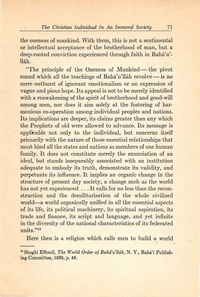 The Christian Individual In An Immoral Society - 71
The Christian Individual In An Immoral Society - 71
the oneness of mankind. With them, this is not a sentimental or intellectual acceptance of the brotherhood of man, but a
deep-rooted conviction experienced through faith in Baha’u’lah.
“The principle of the Oneness of Mankind — the pivot round which all the teachings of Baha’u’llah revolve — is no mere outburst of ignorant emotionalism or an expression of vague and pious hope. Its appeal is not to be merely identified with a reawakening of the spirit of brotherhood and good-will among men, nor does it aim solely at the fostering of harmonious co-operation among individual peoples and nations. Its implications are deeper, its claims greater than any which the Prophets of old were allowed to advance. Its message is applicable not only to the individual, but concerns itself primarily with the nature of those essential relationships that must bind all the states and nations as members of one human family. It does not constitute merely the enunciation of an ideal, but stands inseparably associated with an institution adequate to embody its truth, demonstrate its validity, and perpetuate its influence. It implies an organic change in the structure of present day society, a change such as the world has not yet experienced ...It calls for no less than the reconstruction and the demilitarization of the whole civilized world—a world organically unified in all the essential aspects of its life, its political machinery, its spiritual aspiration, its trade and finance, its script and language, and yet infinite in the diversity of the national characteristics of its federated units.”!°
Here then is a religion which calls men to build a world
- ° Shoghi Effendi, The World Order of Bahd’u’lléh, N. Y., Baha’i Publishing Committee, 1938, p. 42.
[Page 72]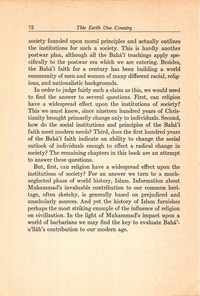 ie This Earth One Country
ie This Earth One Country
society founded upon moral principles and actually outlines the institutions for such a society. This is hardly another postwar plan, although all the Baha’i teachings apply specifically to the postwar era which we are entering. Besides, the Baha’i faith for a century has been building a world community of men and women of many different racial, religious, and nationalistic backgrounds.
In order to judge fairly such a claim as this, we would need to find the answer to several questions. First, can religion have a widespread effect upon the institutions of society? This we must know, since nineteen hundred years of Christianity brought primarily change only to individuals. Second, how do the social institutions and principles of the Baha’i faith meet modern needs? Third, does the first hundred years of the Baha'i faith indicate an ability to change the social outlook of individuals enough to effect a radical change in society? The remaining chapters in this book are an attempt to answer these questions.
But, first, can religion have a widespread effect upon the institutions of society? For an answer we turn to a muchneglected phase of world history, Islam. Information about Muhammad’s invaluable contribution to our common heritage, often sketchy, is generally based on prejudiced and unscholarly sources. And yet the history of Islam furnishes perhaps the most striking example of the influence of religion on civilization. In the light of Muhammad’s impact upon a world of barbarians we may find the key to evaluate Baha’ullah’s contribution to our modern age.
